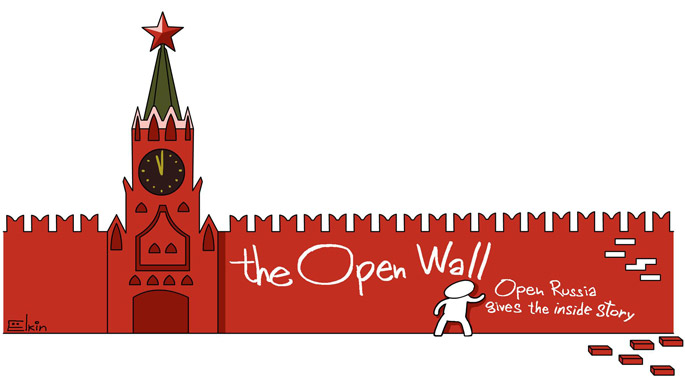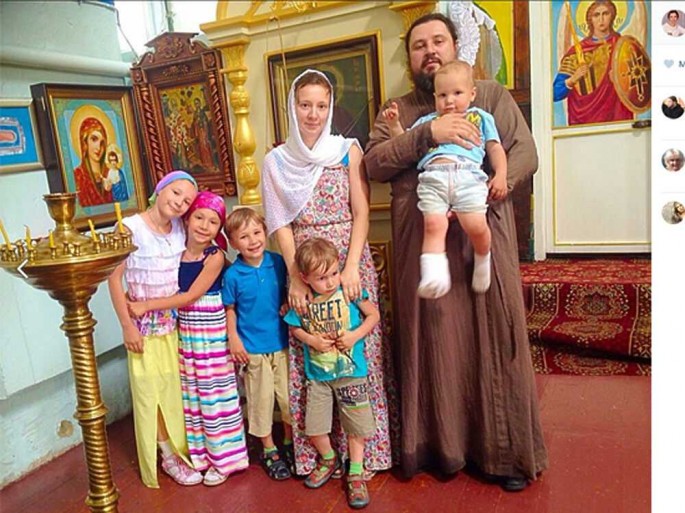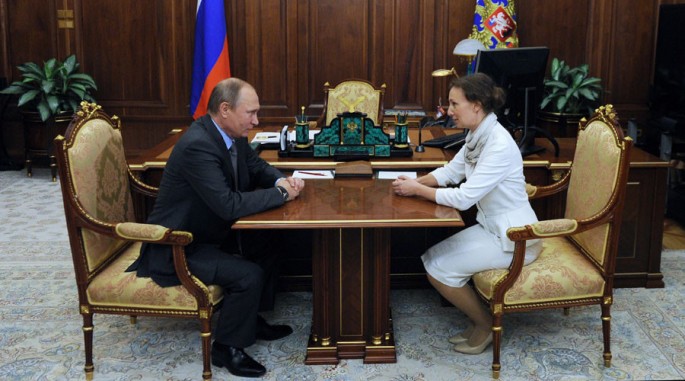God help the children

God help the children
President Putin has appointed a former police general as Ombudsman for Human Rights, a Stalinist as Minister of Education, and now a priest’s wife as Ombudsman for Children’s Rights.

Russia has a new Ombudsman for Children’s Rights. Pavel Astakhov (who infamously championed the“Dima Yakovlev law,” a ban on US adoptions of Russian children, in the wake of the Magnitsky Act) has been replaced by 34-year-old Anna Kuznetsova. An Orthodox psychologist, married to a priest, and mother of six, she somehow finds the time for charity, social and political engagements (Kuznetsova manages the Penza branch of the All-Russia People’s Front and is an election candidate on United Russia’s regional party list).
On the day of the new ombudsman’s appointment, the Runet was rocked by revelations of her opposition to abortion, ultrasound diagnosis and vaccination. If that weren’t enough, she is an HIV/AIDS denialist.
Yandex and the like were soon abuzz with searches for the newcomer. One of the words thrown up was “telegony.” In 2009, Kuznetsova gave an interview to a local website in Penza about this pseudo-scientific hokum: “Based on the relatively new science of telegony, we can say that uterine cells possess information-wave memory. Hence, these cells remember everything that has happened to them. So if a woman has multiple partners, there is a high chance of a weak child being born because of mixed information. This fact exerts particular influence on the moral foundation of the unborn child. Past abortions also affect a child because the cells remember the fear experienced by the foetus – they remember death.”
Kuznetsova has since denied uttering these words, remarking that they sound like the thoughts of a qualified biologist, not her own. Why she believes only a qualified biologist is capable of talking quack remains unclear.
Whatever the case, France-based journalist Natalia Gevorkyan is adamant that the wife of a priest should not be Ombudsman for Children’s Rights in secular Russia: “By virtue of her marital position, she is naturally against abortion and sex before marriage. Even putting telegony to one side, everything else she believes in is equally delightful. But what’s natural in her family is decidedly unnatural in a secular state, in which she is now an official. Not great. It has conflict of interests written all over it.”

Similar conflicts of interest are lurking at every turn. For example, the Patriarchal Commission stated this summer that the reasonable and moderate use of physical punishment in bringing up a child is an integral part of parental rights in the eyes of God. Any contrary opinion is, according to the Russian Orthodox Church, an attack on the family and the traditional spiritual and moral values associated with it. Will the church-going Anna Kuznetsova be able to compartmentalise her religious beliefs, and not preach the divine nature of corporal punishment, in her capacity as ombudsman? Time will tell.
Online users also found that Anna Kuznetsova is a member of a social media community entitled “HIV/AIDS is the greatest hoax of the 20th century.” As a village priest’s wife, she is entitled to believe what she wants, but as Russia’s Ombudsman for Children’s Rights, like it or not, she will have to operate in a different reality. Russia records 270 new cases of HIV infection every day, and in many regions the number of infected women has reached “generalised” epidemic proportions (meaning an infection rate of over 1 percent of the population). We can assume that Kuznetsova will tackle this issue with little regard for Western experience, so sex education for teenagers will remain under lock and key.
To understand how Kuznetsova acquired such baggage on her way up, sociologist Ella Paneyakh studied the activity of the Penza-based Pokrov charity foundation (Kuznetsova’s pet project) and concluded that the organisation effectively promotes “reproductive violence.”
Paneyakh found that Pokrov, which is funded by a presidential grant, runs a citywide programme encouraging public health facilities to deny women abortions: the fewer abortions a clinic performs, the more equipment and money it receives. “Budget clinics funded by Russian taxpayers to provide free services are competing to refuse legally mandated treatment,” she says, stressing that doctors, no longer guided solely by the interests of their patients (thanks to Pokrov), are not only violating their professional ethics, but the law.
Charity workers in Penza react differently to Anna Kuznetsova and her appointment, ranging from delight to barely suppressed profanities. For Ekaterina, a former volunteer at Kuznetsova’s charity foundation, the new ombudsman is a conscientious leader: “We visited children’s homes together, and collected clothes and food for the needy. We held events and festivals. I always knew all the funds raised would go straight to their targets. She was made [ombudsman] because she’s a doer. Such people don’t grow on trees … Anyone could call her up in the middle of the night – she’d listen and help in any way she could.”
Oleg Sharipkov, director of the Penza-based Civil Union foundation for social and charitable initiatives, has known Anna Kuznetsova for years. His impressions of her are best described as contradictory. According to Sharipkov, Kuznetsova “really does love children and does everything she can for them,” but her tenure as ombudsman will be determined by her adherence to traditional values: “I’m almost certain that Anna will push for a legislative ban on abortion regardless of medical factors. She’s already said so on a number of occasions. What’s particularly unpleasant is that Anna firmly backs the ‘Dima Yakovlev law’ and has repeatedly defended it in disputes with colleagues in the charity sector. She is genuinely convinced that the adoption ban is saving our children, because abroad they could die,” says Sharipkov.
God help the children.



